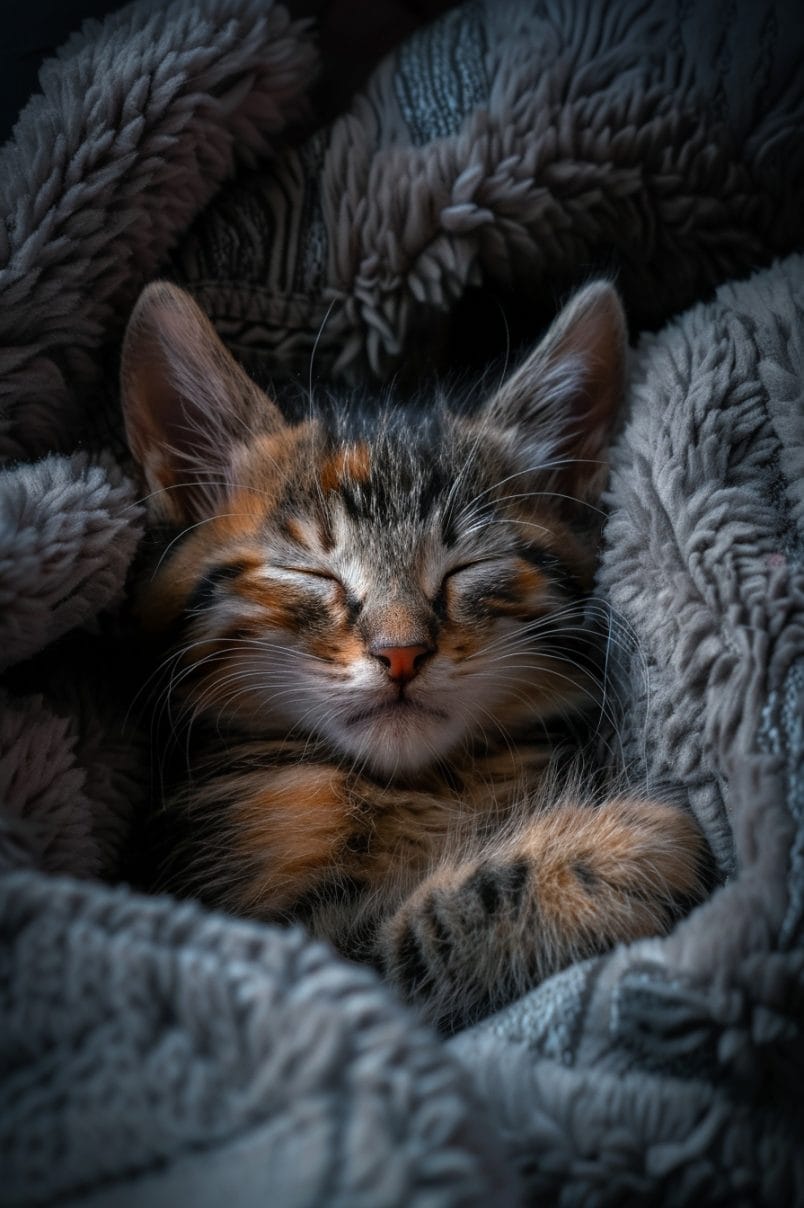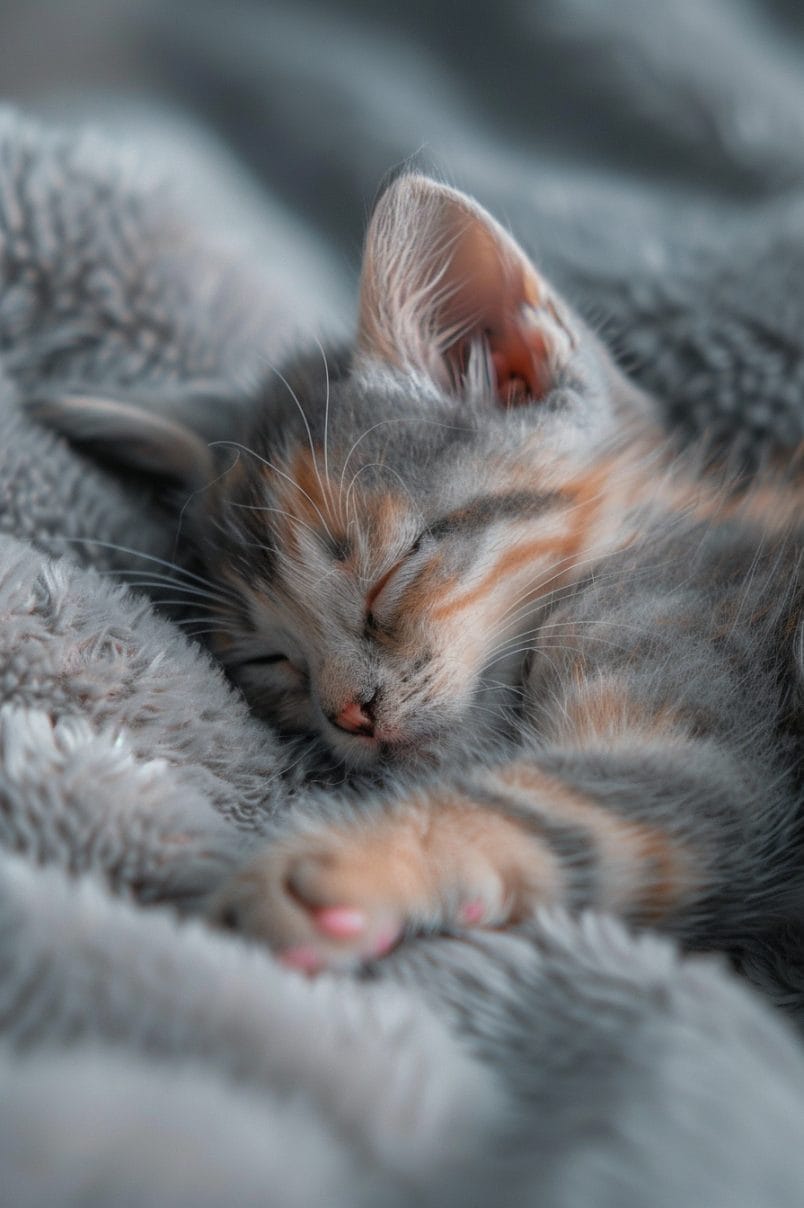
Kittens are born with their eyes closed, and during their early days, they spend most of their time sleeping.
As they grow and develop, sleep remains crucial for their rapid growth and brain development.
Understanding how much sleep your kitten needs is important to ensure they get the rest necessary for their well-being.
How Much Sleep Do Kittens Need?
Kittens need a lot of sleep, especially during their early months.
On average, kittens sleep for 16 to 20 hours a day, with some kittens sleeping as much as 22 hours a day.
This is because kittens are constantly growing and developing, and sleep plays a critical role in this process.
Age Breakdown
Kittens’ sleep patterns change as they grow and develop.
Here’s an age breakdown of kitten sleep:
| Age Range |
Hours of Sleep per Day
|
| 0-4 weeks | 20-22 hours |
| 4-8 weeks | 16-18 hours |
| 8-12 weeks | 14-16 hours |
| 12 weeks and older | 12-14 hours |

Factors Affecting Sleep
A kitten’s sleep patterns can be influenced by various factors that affect their overall well-being.
Understanding these factors helps ensure your kitten gets the rest they need to grow and thrive.
Age
The age of a kitten plays a significant role in how much they sleep.
Young kittens, especially newborns, need more sleep to support their rapid growth and development.
As they grow older and mature, they gradually need less sleep.
Breed
Different cat breeds can have varying levels of activity and sleep requirements.
For example, breeds like Siamese and Abyssinian are known to be more active and may sleep less compared to breeds known for their relaxed nature, like Ragdolls.
Understanding your kitten’s breed characteristics can give you insights into their sleep patterns.
Environment
The environment where a kitten lives can impact their sleep habits.
Kittens generally prefer quiet and comfortable surroundings for sleeping.
A calm environment without loud noises or disruptions allows them to rest peacefully.
Providing a cozy and safe sleeping area can promote healthy sleep habits.
Health
The health of a kitten also affects their sleep patterns.
Kittens with health issues may sleep more than usual as their bodies recover or conserve energy.
Conversely, some health conditions can disrupt sleep, causing kittens to sleep less than average.
Monitoring your kitten’s overall health and addressing any concerns with your veterinarian ensures they receive appropriate care and rest.

Tips for Helping Your Kitten Sleep Well
Ensuring your kitten gets good sleep is crucial for their growth and overall well-being.
Here are practical tips to help your kitten sleep soundly:
Provide a comfortable sleeping space
Create a cozy and comfortable sleeping area for your kitten.
This space should be warm, quiet, and away from any disturbances.
A soft bed or blanket in a corner of a room where they feel safe can help them relax and feel secure.
Consider placing the sleeping area in a location where they can retreat whenever they feel the need to rest.
Establish a routine
Establishing a regular sleep schedule can help your kitten develop healthy sleep habits.
Try to feed them and play with them around the same time each day.
Kittens, like babies, thrive on routine, which helps them understand when it’s time to be active and when it’s time to rest.
Consistency in their daily activities can promote better sleep quality.
Avoid stimulating activities before bedtime
Before bedtime, avoid engaging your kitten in overly stimulating activities.
Active play sessions or loud noises close to bedtime can keep them awake and make it harder for them to settle down.
Instead, offer quiet play or gentle petting to help them wind down before sleep.
This transition prepares them mentally and physically for restful sleep.
Monitor for health issues
Keep an eye on your kitten’s sleep patterns and overall behavior.
Changes in sleep duration or quality can sometimes indicate underlying health issues.
If you notice significant changes in their sleep habits, such as excessive sleeping or difficulty sleeping, consult with your veterinarian.
They can assess your kitten’s health and provide guidance on any necessary adjustments to ensure they receive proper care.
Comfort and reassurance
Lastly, provide comfort and reassurance to your kitten.
Spending time with them during their settling-down period before sleep can strengthen your bond and reassure them that they are safe.
Gentle strokes or quiet words can be comforting and help them feel relaxed before bedtime.

Conclusion
Kittens need a lot of sleep, especially during their early months.
Understanding how much sleep your kitten needs and why it’s crucial for their growth, development, and overall health is essential for ensuring they get the rest they require to thrive.
By providing a comfortable sleeping space, establishing a routine, avoiding stimulating activities before bedtime, and monitoring for health issues, you can help your kitten sleep well and grow into a healthy, happy cat.
FAQs
Kittens need a lot of sleep, especially during their early months. On average, kittens sleep for 16 to 20 hours a day.
Kittens sleep a lot because they are constantly growing and developing, and sleep plays a critical role in this process.
You can help your kitten sleep well by providing a comfortable sleeping space, establishing a routine, avoiding stimulating activities before bedtime, and monitoring for health issues.
- Does Cat Litter Melt Ice? The Complete Guide to Winter Safety - January 30, 2026
- Happy Tail Dogs: Understanding This Common Canine Condition - January 29, 2026
- How Cold Can Outdoor Cats Handle? Feline Winter Safety - January 27, 2026


GIPHY App Key not set. Please check settings